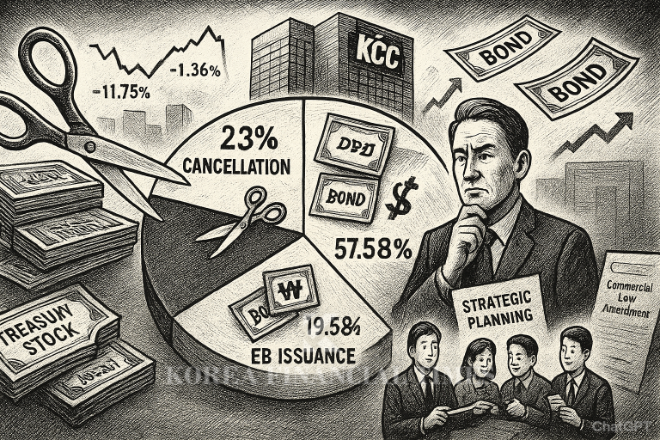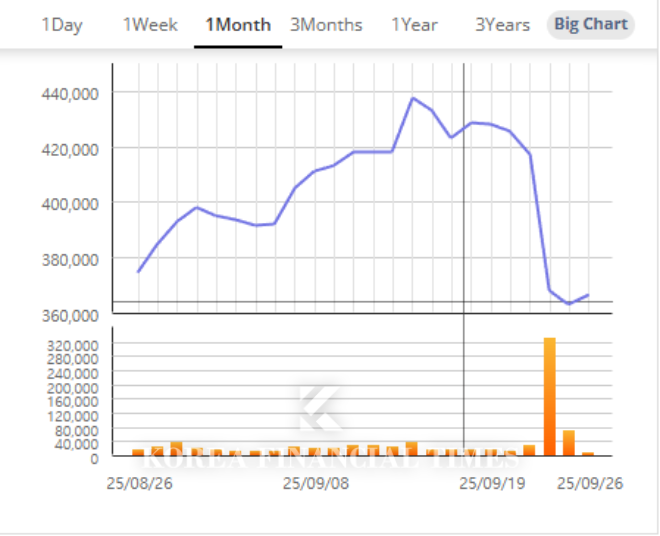 이미지 확대보기
이미지 확대보기KCC disclosed its 'treasury stock utilisation plan' at 8:12am on the 24th, just before the regular market opening. This represents the first corporate value enhancement plan extension since the company's launch in July, forming part of its financial strategy. At the time, the company only mentioned 'asset efficiency and capital structure optimisation' without revealing specific detailed plans.
However, as the board resolution has not yet taken place, the plan will be finalised through future board meetings. EB issuance is expected in the fourth quarter of this year, while treasury stock cancellation and welfare fund contribution are anticipated between the fourth quarter of this year and the first quarter of next year.
Some observers view this decision as a measure to avoid complete treasury stock cancellation. The National Assembly is currently pursuing third commercial law amendments containing mandatory treasury stock cancellation provisions. Discussions also include allowing treasury stock retention for legitimate reasons such as employee compensation and employee stock ownership association contributions.
The employee welfare fund serves as welfare resources for employee housing loans, education funds, and medical expense support. While treasury shares purchased with company funds lack voting rights, these rights are restored when contributed to third parties such as welfare funds.
In particular, critics argue that KCC, given its substantial financial asset holdings, should have considered utilising its Samsung C&T shares (10.1 percent stake) this time. This follows a similar approach when the company issued KRW 882.8 billion worth of EBs backed by HD Korea Shipbuilding & Offshore Engineering shares in July to repay borrowings.
Jung Kyung-hee, analyst at LS Securities, noted: "Institutional investors' primary demand is liquidation of Samsung C&T shares purchased in 2012. Issuing KRW 430 billion worth of treasury stock EBs without utilising Samsung C&T shares, which offer only 1.34 percent dividend yield, represents an unusual decision from equity investors' perspective."
Treasury stock cancellation is generally recognised as the most effective shareholder return method. Conversely, utilising shares for EB issuance makes it difficult to avoid criticism of weak shareholder return commitment. However, from a corporate perspective, issuing EBs backed by treasury shares offers the advantage of securing funds without diluting management control. Unlike rights offerings, no new shares are issued, maintaining existing shareholders' ownership ratios.
Currently, Chairman Chung Mong-jin is KCC's largest shareholder with a 20 percent stake. Including specially related parties, this reaches 35.61 percent. Adding treasury shares brings the ownership ratio above 50 percent, securing stable management control.
Following the treasury stock utilisation plan announcement, KCC shares closed at KRW 368,000 on the 24th, down 11.75 percent from the previous day. The closing price on the 25th recorded KRW 363,000, down 1.36 percent from the previous day.
 이미지 확대보기
이미지 확대보기Shin Haeju (hjs0509@fntimes.com)
가장 핫한 경제 소식! 한국금융신문의 ‘추천뉴스’를 받아보세요~
데일리 금융경제뉴스 Copyright ⓒ 한국금융신문 & FNTIMES.com
저작권법에 의거 상업적 목적의 무단 전재, 복사, 배포 금지







![Hyundai Mobis Posts Record Results, Pivots to Robotics and Electrification [KFT Topic]](https://cfnimage.commutil.kr/phpwas/restmb_setimgmake.php?pp=006&w=284&h=214&m=5&simg=2026012911595100522141825007d12411124362.jpg&nmt=18)
![One Year In: CEO Hyun Shin-kyun Transforms LG CNS into KRW 6 Trillion AI Powerhouse [KFT Topic]](https://cfnimage.commutil.kr/phpwas/restmb_setimgmake.php?pp=006&w=284&h=214&m=5&simg=2026012807381208149141825007d12411124362.jpg&nmt=18)
![Samsung's 'Last Chance': Lee Jae-yong Pushes HBM4 as Make-or-Break Moment [KFT Topic]](https://cfnimage.commutil.kr/phpwas/restmb_setimgmake.php?pp=006&w=284&h=214&m=5&simg=2026012623242806011141825007d122461258.jpg&nmt=18)
![Hanwha Aerospace Stock Surges 3,500% in Six Years on 'Extraordinary Strength' [KFT Topic]](https://cfnimage.commutil.kr/phpwas/restmb_setimgmake.php?pp=006&w=284&h=214&m=5&simg=2026012609443900770141825007d12411124362.jpg&nmt=18)
!['Chung Eui-sun Declares Robot Management Era'... Hyundai Motor Group to Lead Robotics Age with 'Physical AI' [KFT Topic]](https://cfnimage.commutil.kr/phpwas/restmb_setimgmake.php?pp=006&w=284&h=214&m=5&simg=20260106111449071567492587736121125197123.jpg&nmt=18)
![Lee Jae-yong and Chey Tae-won, Korea's 'Semiconductor Duo,' Head to China... What's the Status of Local Operations? [KFT Topic]](https://cfnimage.commutil.kr/phpwas/restmb_setimgmake.php?pp=006&w=284&h=214&m=5&simg=2026010608232205705141825007d12411124362.jpg&nmt=18)
!['Beyond Mobile to Robotics': LG Innotek Continues Portfolio Expansion [KFT Topic]](https://cfnimage.commutil.kr/phpwas/restmb_setimgmake.php?pp=006&w=284&h=214&m=5&simg=2026010508201109906141825007d12411124362.jpg&nmt=18)
![Doosan Enerbility Eyes Return to 'A' Credit Rating After 9 Years on Nuclear Power and Gas Turbine Boom [KFT Topic]](https://cfnimage.commutil.kr/phpwas/restmb_setimgmake.php?pp=006&w=284&h=214&m=5&simg=2026010208511504157141825007d12411124362.jpg&nmt=18)
![Naver hits KRW 10 trillion revenue but premium valuation in doubt [KFT Topic]](https://cfnimage.commutil.kr/phpwas/restmb_setimgmake.php?pp=006&w=110&h=79&m=5&simg=2026011308484406594141825007d12411124362.jpg&nmt=18)
![Three Generations of Hyundai's American Challenge: From Budget Cars to Premium EVs [KFT Topic]](https://cfnimage.commutil.kr/phpwas/restmb_setimgmake.php?pp=006&w=110&h=79&m=5&simg=2026011209372904936141825007d12411124362.jpg&nmt=18)
![Koo Kwang-mo's Vision for AI and Robotics Drives LG Group's Transformation [KFT Topic]](https://cfnimage.commutil.kr/phpwas/restmb_setimgmake.php?pp=006&w=110&h=79&m=5&simg=2026012123034202714141825007d122461258.jpg&nmt=18)
!['Expansion' S-OIL vs. 'Caution' GS Caltex [KFT Topic]](https://cfnimage.commutil.kr/phpwas/restmb_setimgmake.php?pp=006&w=110&h=79&m=5&simg=2026012010260905723141825007d12411124362.jpg&nmt=18)
!["Samsung Is Back," Chip Chief Declares, Eyeing Record Profit on HBM Recovery [KFT Topic]](https://cfnimage.commutil.kr/phpwas/restmb_setimgmake.php?pp=006&w=110&h=79&m=5&simg=2026011408580109459141825007d12411124362.jpg&nmt=18)